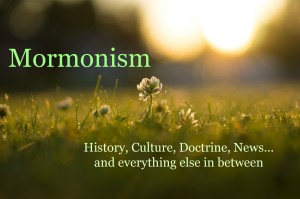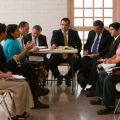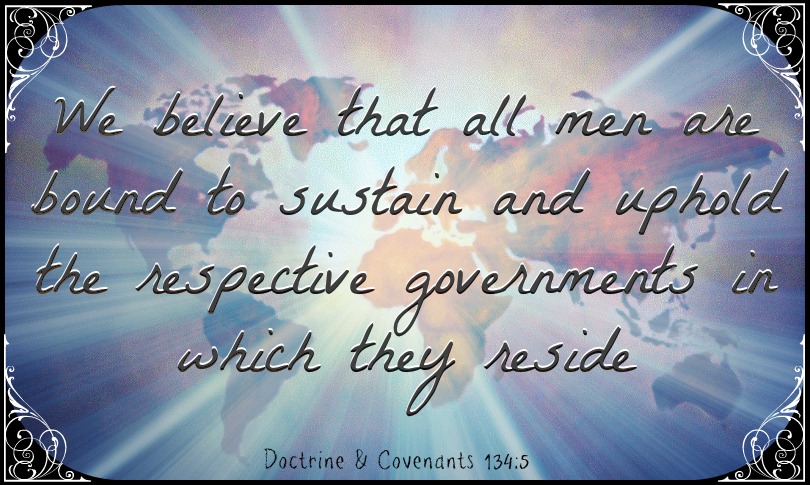This is my 500th article on LDSBlogs. More Good Foundation asked me some questions about myself, my faith, and my experiences writing about Mormonism for this milestone.
Terrie, what prompted you to share your faith online?
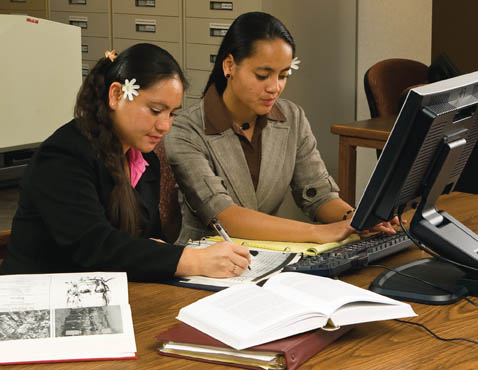 I got my first computer when they were unusual enough for mine to be a local tourist attraction and I was online long before most people. As a writer, I’m at my computer all day and it is natural for me to spend time sharing what matters to me most. I was asked to explain Mormonism on several sites and enjoyed hearing from people who were surprised by what they learned. I’ve been doing it ever since.
I got my first computer when they were unusual enough for mine to be a local tourist attraction and I was online long before most people. As a writer, I’m at my computer all day and it is natural for me to spend time sharing what matters to me most. I was asked to explain Mormonism on several sites and enjoyed hearing from people who were surprised by what they learned. I’ve been doing it ever since.
What have been some of the rewards? Do you recall any specific responses to your writing that have been particularly significant?
I wrote an article on For the Strength of Youth, a booklet for Mormon teens that spells out appropriate moral behavior. A youth minister of another faith emailed me and said his church offered nothing like that and his youth needed it. He wanted to know if I thought my church would mind if he handed out copies of it to the teens in his congregation and used it to help them choose a moral lifestyle. I assured him there would be no problem with that, since Mormons feel these standards benefit teens of any faith.
My favorite emails are from people who tell me they now understand that a lot of what they’ve heard about Mormons isn’t true and that they intend to help straighten out the misconceptions when they hear them.
How has the gospel of Jesus Christ affected your outlook in regard to adversity?
I was once coping with an upcoming life change that scared me. I’d prayed about it and received in my heart a reminder that if I’m prepared, I have no need to fear. Later, in frustration, I prayed and told God that I had done all the preparations and was still scared. A very clear thought came into my mind: “I said you didn’t need to be afraid. I didn’t say you couldn’t choose to be afraid.”
I realized that’s what I was doing. I was choosing fear instead of faith. Since then, I’ve tried to put my trials into God’s hands. I’ve realized every trial I face has a purpose and many times, I’ve been able to help others because I’ve been through what they’re facing. I’ve learned and grown from them when I’ve allowed myself to do that. When I have a trial, I trust God and Jesus Christ and look for the lessons to be learned—and then I write about the lessons.
How do you feel personally about Jesus Christ?
 I grew up in a home with parents who had different religions and attended neither church regularly. My mother read Bible stories to me and I learned to recite a little prayer at bedtime. It was more of a tradition than a way of life.
I grew up in a home with parents who had different religions and attended neither church regularly. My mother read Bible stories to me and I learned to recite a little prayer at bedtime. It was more of a tradition than a way of life.
After I joined the Church, I realized Mormons saw Jesus Christ in a very personal way. My friend Nanette once told me that when she prays, she pictures Jesus Christ sitting beside her as she talks and this makes it easier for her to have a very personal prayer. I realized I needed to know Him as a very real person who loves me and is personally involved in my life. When I study the gospel, pray, or sing hymns, I ask myself what this teaches me about the Savior and how it applies to me.
Having this personal relationship with Jesus Christ has changed everything. There is someone who really understands me and no matter how isolated I feel during a trial, there is always one person who knows what I’m going through and who gives perfect advice. I’ve had a lot of challenges in my life and having someone to help me through them has made them manageable. I love having an eternal focus to my life because it is so easy to get caught up in the temporal side of things. Having a personal and loving relationship with Christ helps me look past today and into eternity.
What do you feel the world is most missing?
Thomas S. Monson, the current Mormon prophet, said:
We become so caught up in the busyness of our lives. Were we to step back, however, and take a good look at what we’re doing, we may find that we have immersed ourselves in the “thick of thin things.” In other words, too often we spend most of our time taking care of the things which do not really matter much at all in the grand scheme of things, neglecting those more important causes. (President Thomas S. Monson, “What Have I Done for Someone Today?” Ensign, November 2009).
I think a great many of the world’s problems and arguments would be easily resolved if we looked at them from an eternal perspective. We’d remember that every person—even one we disagree with—is a child of God who is deeply loved. We’d remember that the temporal issues that get us so excited today may not have any eternal impact and so aren’t worth spending our lives on or getting overly worked up over. We need to focus more of our time and emotions on the eternal issues of life and not the trivia.
What would you say to an audience who doubts that God lives and that they can know truth?
When I was first learning about Mormonism, I told a friend I wished there was a science experiment that would help me know what is true. I felt all you could do was to guess and I hated guessing. She told me she knew what was true and taught me how to pray for answers instead of just guessing or trying to approach things only intellectually.
As I mentioned earlier, it’s important to get to know God and Jesus Christ. We need to learn about God through scriptures and from people who know Him. Then we need to talk to Him—you can’t get to know people you never talk to. Even if we think no one is listening, we can talk and then sit quietly to see what impressions enter our minds. In time, as we know God better, we learn to recognize when those thoughts come from Him.
What are some of your personal passions?
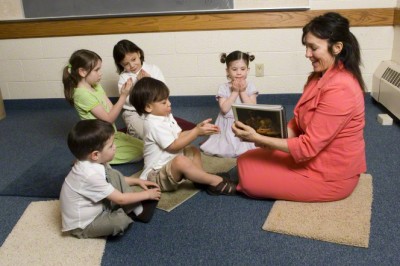 I love to teach, particularly if the lesson involves flannel boards and puppets. I homeschooled my children, who are now grown, and today I teach preschoolers at church. I love history and so I love genealogy, which is history made personal. The ability to connect myself to my extended family and to find out how I became me is so exciting. I’ve always loved books, writing, and reading. From a gospel perspective, my favorite doctrines involve prophets, families, the role of women, and Christian kindness, and I write about those a lot.
I love to teach, particularly if the lesson involves flannel boards and puppets. I homeschooled my children, who are now grown, and today I teach preschoolers at church. I love history and so I love genealogy, which is history made personal. The ability to connect myself to my extended family and to find out how I became me is so exciting. I’ve always loved books, writing, and reading. From a gospel perspective, my favorite doctrines involve prophets, families, the role of women, and Christian kindness, and I write about those a lot.
Can you share one or two doctrines that are sorely missing from general Christendom that have been revealed in our day, about which you’ve written?
When I was ten, I attended a summer program at a neighborhood church. We were learning about the Old Testament and when I learned about prophets, I knew right away that the concept of a prophet solved the problem I was already struggling with—how do you really know what is true if all the churches disagree? I asked the teacher who today’s prophet was and she said we didn’t need one. I knew better—if we didn’t need one, there would only be one church. Once I found out who the prophet was and confirmed it through prayer, life became so much more sensible. For me, a prophet today serves the same purpose as a prophet in the past—to show us what God wants us to do and what is really true.
When I was in seventh grade, I wrote a story for school about a girl who asked, “What’s the point of having a family if it isn’t forever?” I wasn’t a Mormon then, but as I wrote those words, I knew they were true—families were meant to be forever. I had been told from early childhood that in Heaven everything would be perfect and I’d be happier than I could imagine. I cannot be happy without my family. Who wants to live forever alone? Most people don’t even want to get through this life alone. I think the world would be quite different if we understood the eternal potentials of our families.
Can you share the short-version of your conversion to the Savior and His gospel, and link to the fuller version for us?
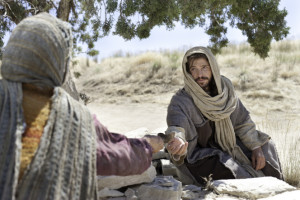 My parents, having different religions, decided their children could choose their own faiths. I took that as a sacred responsibility even as a child, but the more I searched, the more confused I became. I’m a compulsive list maker so I started a notebook in which I listed every doctrine I learned of. I marked it true, not true, or maybe. I had some idea that scanning the three columns would somehow help me find a church.
My parents, having different religions, decided their children could choose their own faiths. I took that as a sacred responsibility even as a child, but the more I searched, the more confused I became. I’m a compulsive list maker so I started a notebook in which I listed every doctrine I learned of. I marked it true, not true, or maybe. I had some idea that scanning the three columns would somehow help me find a church.
I started to develop some ideas about truth that I couldn’t find in any of the churches I studied—modern prophets and eternal families, for instance. I looked for a loving God who was personally involved in my life and for a faith that required a great deal of me and would change me. What was the point of a religion that didn’t call on me to be the best Christian I could be?
I eventually did find it, but not where anyone thought I would. A portion of my story can be found here in the August 1996 issue of New Era, an official Church of Jesus Christ magazine.
Additional Resource:
Terrie Lynn Bittner’s Mormon.org profile
Some of Terrie’s Popular Posts:
What it means to Be a Mormon Mother
The Mormon God: Kind and Loving
About Terrie Lynn Bittner
The late Terrie Lynn Bittner—beloved wife, mother, grandmother, and friend—was the author of two homeschooling books and numerous articles, including several that appeared in Latter-day Saint magazines. She became a member of the Church at the age of 17 and began sharing her faith online in 1992.


